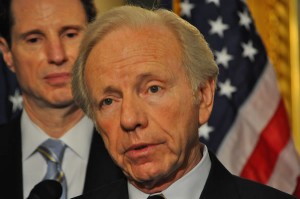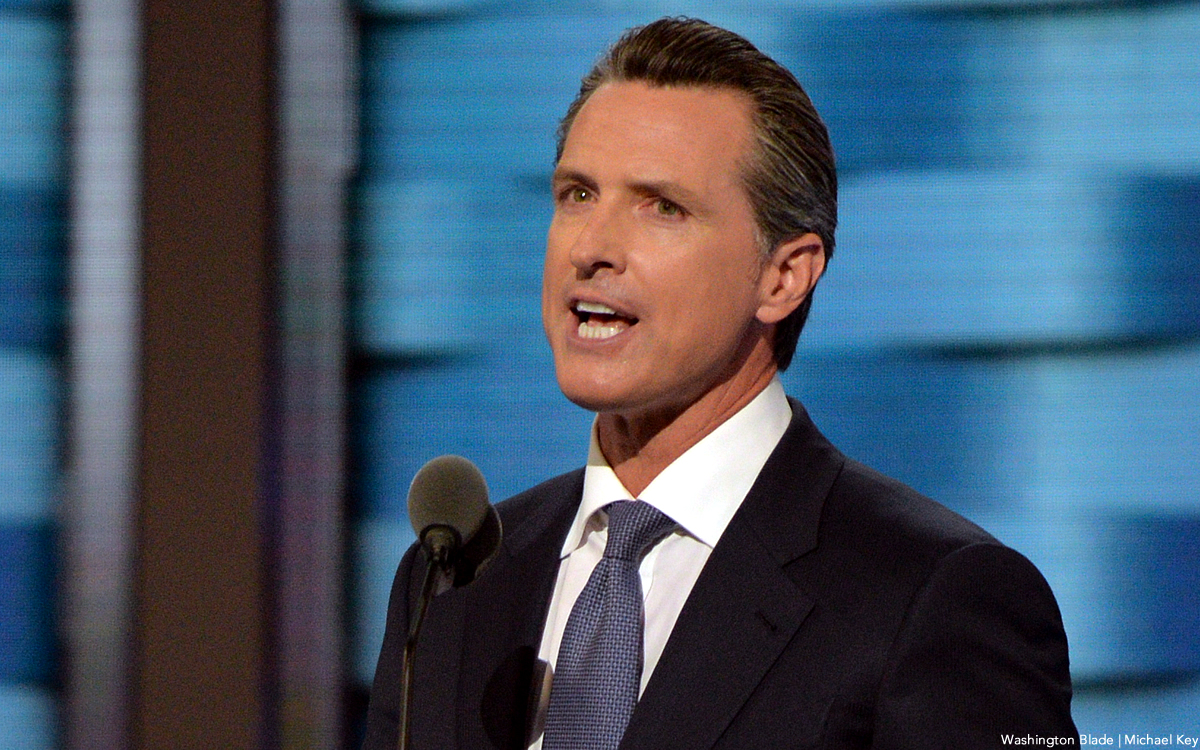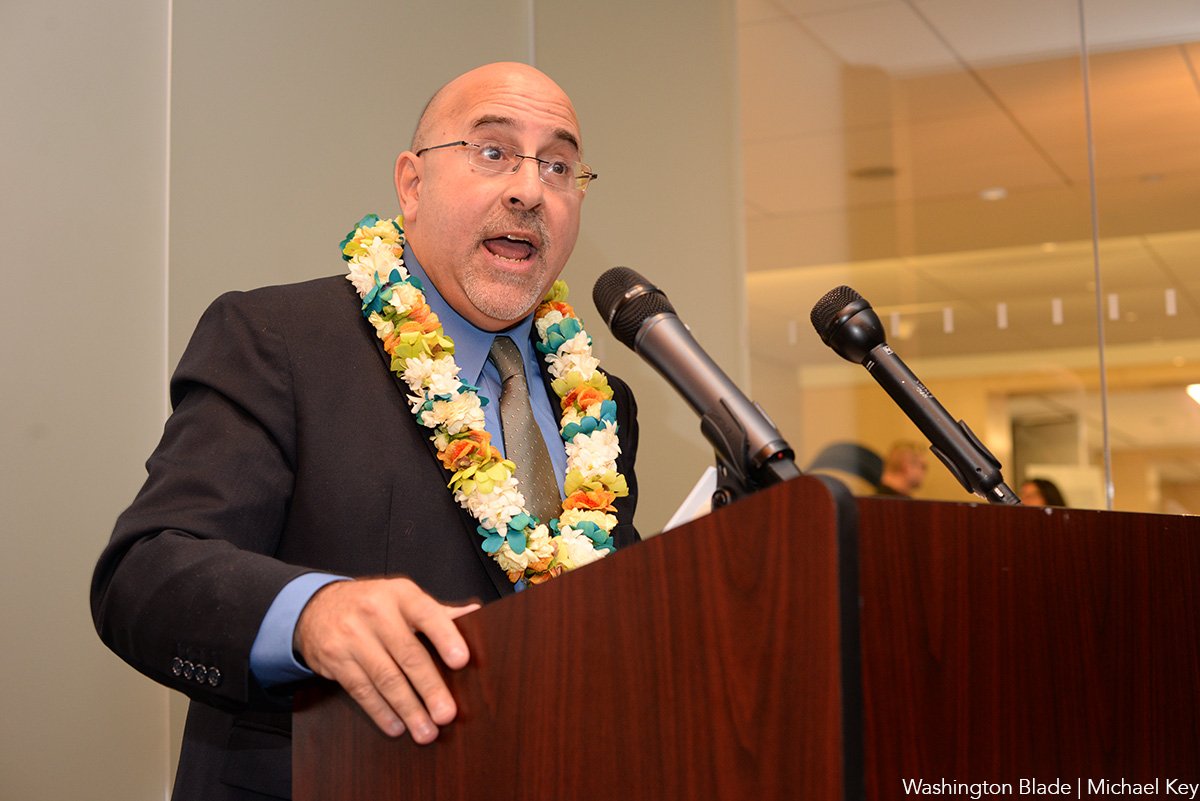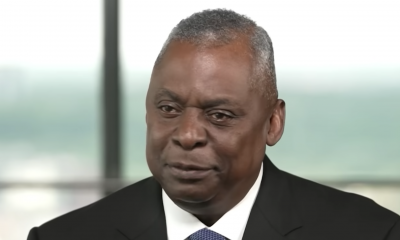National
Lieberman unveils Senate ‘Don’t Ask’ repeal legislation

Sen. Joseph Lieberman (I-Conn.) is optimistic about repeal "Don't Ask, Don't Tell" in lame duck. (Blade photo by Michael Key).
U.S. Sen. Joseph Lieberman (I-Conn.) introduced a bill Wednesday to repeal “Don’t Ask, Don’t Tell,” all the while acknowledging Congress may have to settle with a moratorium as legislative action this year as opposed to outright repeal.
Lieberman touted the legislation — the first Senate bill introduced to repeal “Don’t Ask, Don’t Tell” — during a press conference on Capitol Hill.
“This legislation will repeal the current policy of discrimination based on sexual orientation in America’s armed forces and offer in its place a policy of equal opportunity to serve and defend our country,” he said.
The Military Readiness Enhancement Act of 2010 would repeal the 1993 law barring gay, lesbian and bisexual people from open service in the U.S. military and put a non-discrimination policy in its place.
To accomplish repeal, the bill would require the Pentagon working group considering “Don’t Ask, Don’t Tell” to submit recommendations on how to best repeal the law to Defense Secretary Robert Gates no later than 270 days after the bill is enacted.
Additionally, the bill would require Gates to issue regulations to enact the bill within 60 days of receipt of the working group’s report, and it requires the secretary of each military department to revise regulations as needed no later than 60 days after that.
Kevin Nix, spokesperson for the Servicemembers Legal Defense Network, said the Senate bill is identical to House legislation, sponsored by Rep. Patrick Murphy (D-Pa.), except the Senate bill gives the Pentagon a longer time for implementation.
“This bill reflects the fact that the military wants some time to do the best transition possible to open service,” Nix said.
The Senate bill has 11 eleven co-sponsors. Many appeared at the press conference with Lieberman, including Senate Armed Services Committee Chairman Carl Levin (D-Mich.), Sen. Mark Udall (D-Colo.), Sen. Roland Burris (D-Ill.), Sen. Ron Wyden (D-Ore.) and Sen. Kirsten Gillibrand (D-N.Y.).
Levin said he’s been opponent of “Don’t Ask, Don’t Tell” since before it was enacted into law in 1993.
“It diminishes our readiness, it diminishes our strength, it denies us, robs us of the men and women to the defense of our country,” he said.
To follow up on the hearing that took place last month, Levin said he’ll hold another hearing on gays in the military March 18 with an outside panel of experts.
Burris, who’s black, called the introduction of the legislation a “very personal issue of basic fairness,” recalling how his family members were once only allowed restricted roles in the U.S. military.
“For all their skills, all their talents, their intelligence and their valor, they were forced to chose between two or three roles when they were in the service: working as a cook, or digging ditches or driving trucks,” Burris said. “That memory is especially crisp as I stand here today to bring an end to this discriminatory policy.”
Gillibrand vilified “Don’t Ask, Don’t Tell” for what she said was its extremely harmful impact on the U.S. military.
“This policy is one of the most corrosive, destructive policies to the strength of our armed services, to our military readiness, to our national security and to the morale of our troops,” she said.
Gillibrand said “Don’t Ask, Don’t Tell” was particularly detrimental for women in the armed services.
She said women represent 17 percent of the armed services, but more than one-third of all dismissals, including more than one-half in the Army, are female.
Absent among the co-sponsors is any Republican senator. Despite this initial lack of GOP support, Lieberman said he anticipates Republican support for the legislation as it moves forward.
“I believe we’re going to have some Republican support in this,” he said. “There’s a core group that is openly — that is actively concerned.”
While touting the standalone legislation, Lieberman and Levin said the defense authorization bill would be the most likely legislative vehicle to advance repeal.
The lawmakers also said that if they can’t find the votes this year to overturn “Don’t Ask, Don’t Tell,” they would instead try to enact a moratorium on discharges.
During the markup for the defense authorization bill in May, Lieberman said the committee would try for a vote in the Senate Armed Services Committee first on repeal, and if that’s unsuccessful, committee members would pursue a moratorium.
“We’re going to try for a full repeal,” Lieberman said. “If the votes aren’t there in committee or on the floor, a moratorium, I think, is a good interim step and I’ll certainly be open to it.”
But Nix said his organization is still pushing for outright repeal this year as opposed to a moratorium.
“I think it’s premature to talk about the moratorium because we have, as the chairman said, until May to really focus on full repeal, so let’s try to do that first,” Nix said.
In a statement, Joe Solmonese, president of the Human Rights Campaign, heralded the introduction of Lieberman’s bill as “continuing the momentum to repeal ‘Don’t Ask, Don’t Tell’ this year.”
“His introduction of the Military Readiness Enhancement Act of 2010 is a bold, patriotic move that will long be remembered as key to removing the stain of the discriminatory ‘Don’t Ask, Don’t Tell’ law from the U.S. code,” he said.
Federal Government
White House finds Calif. violated Title IX by allowing trans athletes in school sports
Education Department threatens ‘imminent enforcement action’

The Trump-Vance administration announced on Wednesday that California’s Interscholastic Federation and Department of Education violated federal Title IX rules for allowing transgender girls to compete in school sports.
In a press release, the U.S. Department of Education’s Office of Civil Rights threatened “imminent enforcement action” including “referral to the U.S. Department of Justice” and the withholding of federal education funding for the state if the parties do not “agree to change these unlawful practices within 10 days.”
The agency specified that to come into compliance; California must enforce a ban excluding transgender student athletes and reclaim any titles, records, and awards they had won.
Federal investigations of the California Interscholastic Federation and the state’s Department of Education were begun in February and April, respectively. The Justice Department sued Maine in April for allowing trans athletes to compete and refusing a similar proposal to certify compliance within 10 days.
Broadly, the Trump-Vance administration’s position is that girls who are made to compete against trans opponents or alongside trans teammates are unfairly disadvantaged, robbed of opportunities like athletics scholarships, and faced with increased risk of injury — constituting actionable claims of unlawful sex discrimination under Title IX.
This marks a major departure from how the previous administration enforced the law. For example, the Department of Education issued new Title IX guidelines in April 2024 that instructed schools and educational institutions covered by the statute to not enforce categorical bans against trans athletes, instead allowing for limited restrictions on eligibility if necessary to ensure fairness or safety at the high school or college level.
Sports aside, under former President Joe Biden the department’s Office of Civil Rights sought to protect against anti-LGBTQ discrimination in education, bringing investigations and enforcement actions in cases where school officials might, for example, require trans students to use restrooms and facilities consistent with their birth sex or fail to respond to peer harassment over their gender identity.
Much of the legal reasoning behind the Biden-Harris administration’s positions extended from the 2020 U.S. Supreme Court case Bostock v. Clayton County, which found that sex-based discrimination includes that which is based on sexual orientation or gender identity under Title VII rules covering employment practices.
A number of high profile Democrats, including California Gov. Gavin Newsom, have recently questioned or challenged the party’s position on transgender athletes, as noted in a statement by Education Secretary Linda McMahon included in Wednesday’s announcement.
“Although Gov. Gavin Newsom admitted months ago it was ‘deeply unfair’ to allow men to compete in women’s sports, both the California Department of Education and the California Interscholastic Federation continued as recently as a few weeks ago to allow men to steal female athletes’ well-deserved accolades and to subject them to the indignity of unfair and unsafe competitions.”
Federal Government
Trump’s dismantling of US foreign aid derails HIV prevention effort in Africa
FDA approved breakthrough preventative drug lenacapavir earlier this month

On June 18, the Food and Drug Administration approved a long-acting injectable for the prevention of HIV that could have a transformational impact on decades-long efforts to end the epidemic in the U.S. and abroad.
Offering robust protection with just two doses per year, lenacapavir has the potential to dramatically improve uptake and adherence compared to daily oral PrEP regimens like Truvada or Descovy, particularly for high risk populations living in places with poor health infrastructure or where stigma about HIV discourages frequent testing and clinic visits.
According to the New York Times, however, the rollout of lenacapavir for HIV prevention overseas has been stymied by the gutting of agencies, staff, programs, and funding dedicated to foreign aid and public health during President Donald Trump’s second term.
Among other moves, the administration has frozen or withdrawn nearly all U.S. foreign development assistance, dismantled the U.S. Agency for International Development and reduced the size of its workforce by more than 95 percent, and shuttered key public health units housed under the U.S. Department of Health and Human Services, the National Institutes of Health, the Centers for Disease Control and Prevention, and the FDA.
As a result, the Times reports, HIV programs across the African continent have been “scrambling to procure drugs that the United States once supplied, replace lost nurses and lab technicians, and restart shuttered programs to prevent new infections.”
Experts fear HIV infection rates are climbing in some of the hardest-hit countries, but since the U.S. pulled funding for data collection and monitoring, there is no way to know for sure.
Historically, the U.S. has provided about 75 percent of all global spending on efforts to fight the epidemic, a reflection of the extent to which there was broad bipartisan support for the allocation of resources for this purpose through programs like the President’s Emergency Plan for AIDS Relief. Trump continued this legacy in his first term, launching the ambitious Ending the HIV Epidemic initiative that was continued under former President Joe Biden.
After returning to the White House, however, the president and his administration have justified their slash-and-burn cuts to the federal government’s work in international development and public health by arguing that funds and resources sent to overseas nations are too often pilfered by corrupt foreign state actors or wasted on ineffectual programs.
Trump and his allies also believe the U.S. should no longer be expected to shoulder such a disproportionate share of the responsibility for foreign aid, and that other countries are likelier to step up and contribute more in response to America’s retreat.
National
Evan Wolfson on the 10-year legacy of marriage equality
And the urgent need to fight now to protect Obergefell ruling

It was 10 years ago this week — on June 26 — when gay marriage became the law of the land with the landmark Supreme Court decision Obergefell v. Hodges. Both Jim Obergefell and Freedom to Marry founder Evan Wolfson contributed to the foreword of a new coffee table book, “LOVE: The Heroic Stories of Marriage Equality,” curated by photographer Frankie Frankeny and writer John Casey.
With the current political climate, many fear that marriage equality could be overturned. In my last interview with Evan Wolfson back in 2017, Trump had just started his first term. I asked him then, “Is gay marriage safe?”
Here’s what he said:
“Look, anything can happen. So I don’t think we should ever be complacent or give up or stop working. Even though the election was a catastrophe and our country is very much on the wrong path, I actually think there are other communities, values, and causes we care about that are more in danger. If we stand in solidarity with others and keep moving forward, we will also secure our own gains.
“I’m not really worried they’re going to take away the freedom to marry. That’s a very hard thing to do. Even former or current opponents are mostly focused on other things.
“We won the freedom to marry not just in court, but by shifting public opinion—growing support from 27% when I argued the first trial in Hawaii to 63% in 2015 when the Supreme Court ruled. That didn’t go away on Election Day. More than a million gay people have gotten legally married in the U.S.—and each of those marriages represents family, friends, and allies who support them. That didn’t go away either.
“We won over a hundred court rulings before the final one, and that legal foundation didn’t disappear. We built ‘facts on the ground,’ shifted opinion, mobilized allies. We have to keep doing that work.
“And Gallup just reported record-high support for marriage equality—up to 47% even among Republicans. So yes, we need vigilance, but I don’t think losing marriage equality is the biggest threat we face.”
I recently asked Wolfson if he still stands by that statement.
“So far, I stand by everything I said,” Wolfson responded. In our new conversation, Wolfson elaborated:
“There are other communities and values in more immediate danger. If we stand in solidarity and keep moving forward, we’ll secure our own rights too.
“I’m not worried they’re going to take away the freedom to marry. That’s extremely difficult to undo. Even our opponents have moved on to other battles.
“Let’s remember how we got here: by winning over public opinion through years—decades—of organizing, storytelling, and showing up. When we stood before the court in 2015, public support had climbed from 27% to 63%. That was no accident. And it hasn’t gone backward.
“Of course people are worried now. There’s a lot to worry about. But sitting around cataloging 100 possible future disasters won’t help. If you’re worried—about marriage, about immigrants, about anti-Semitism, the economy, women’s rights, trans rights, democracy—then the answer is to get to work. Worry doesn’t protect us. Action does.”
He added:
“It’s hard to undo a right. It can happen—look at Dobbs overturning Roe v. Wade—but it’s rare. And even if the Supreme Court were to roll back Obergefell, we put a fallback in place: The Respect for Marriage Act.
“Thanks to that bipartisan legislation—signed by President Biden on the White House lawn—any marriage performed legally in one state must be recognized in all 50 states and by the federal government. Even if Obergefell fell, couples could still marry in states where it remains protected and be recognized nationally.
“That act passed with support from Republicans, including some who once voted for the so-called Defense of Marriage Act.
“So yes, I understand the fear. But fear alone won’t protect us. We all need to do the work—each in our own way.”
Wolfson also reflected on the broader threats to democracy:
“None of us is 100% safe from the assaults and corruption of this current regime. That’s why we must reclaim political power—by electing better lawmakers, reforming the courts, and reaffirming the rule of law, democracy, and pluralism.
That’s not just an LGBT issue—it affects everyone. But queer people, especially trans people, are among those most targeted. And we’ve seen how divide-and-conquer politics and demonization are weaponized to climb to power.
“The trans conversation is at an earlier stage than that for gay people, which makes it more vulnerable. Republicans are exploiting that. And yes, some missteps in our activism have made things harder. But we can course-correct.
“Books like Frankie’s remind us of what we’ve already overcome: the AIDS crisis, Reagan-era discrimination, legal persecution. We rose to those challenges, and we can rise to this one.”
As Wolfson puts it:
“This is our generation’s call to action. We have to respond. And if we do it together—with solidarity and purpose—we will protect the people and values we love.”
“LOVE: The Heroic Stories of Marriage Equality” includes more than 360 pages of wedding photos and stories that are inspiring to read. The book is available everywhere.




















